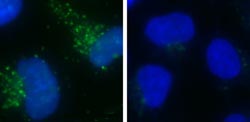Protein identified that can lengthen our life?

The picture shows cells which synthesizes a green fluorescent protein attached to autophagosomes and visible in a fluorescense microscope. The cell nuclei are coloured blue. In the left picture normal cells are shown, whilst the ones to the right lacks SNX18. The cells without SNX18 have significantly fewer autophagosomes.<br>Photo: Umeå University<br>
In animal experiments on both simple organisms like fruit flies and in more complex animals like mice, researchers have seen that stimulating autophagy leads to increased longevity. It is still unclear whether these results are directly translatable to humans.
However, there are theories that calorie restriction, which is a relatively well-established way of increasing longevity, induces higher levels of autophagy, which would help delay aging.
Cells metabolize their old proteins and cell organelles by breaking them down in a process called autophagy. The term comes from Greek and means roughly to eat oneself. Autophagy is important in cleaning out defective components that otherwise can damage cells and cause diseases.
Molecules that are to be broken down are enclosed in a membrane vesicle that forms an organelle called an autophagosome. This then merges with a lysosome, a cell organelle containing many different enzymes that are specialized in breaking down biomolecules. The metabolic products can then be recycled by the cells to synthesize new molecules.
Karin Håberg’s studies show that SNX18 binds to and can reshape cell membranes. Her studies of the role played by SNX18 in autophagy showed that when the cells’ production of SNX18 was stopped by RNA interference, the number of autophagosomes declined drastically, thereby inhibiting the autophagy process.
When the cells were manipulated instead to overproduce SNX18, the number of autophagosomes increased. Karin Håberg was also able to demonstrate that it is precisely the capacity to re-model membranes that is the key to SNX18’s function in the formation of autophagosomes. The studies of autophagy were conducted in collaboration with a research team at Oslo University led by Dr. Anne Simonsen.
Karin Håberg can be reached at: phone +46 (0)90-786 64 38;
e-mail karin.haberg@medchem.umu.se
Reference:
Karin Håberg, Department of Medical Biochemistry and Biophysics, dissertation:
Media Contact
All latest news from the category: Life Sciences and Chemistry
Articles and reports from the Life Sciences and chemistry area deal with applied and basic research into modern biology, chemistry and human medicine.
Valuable information can be found on a range of life sciences fields including bacteriology, biochemistry, bionics, bioinformatics, biophysics, biotechnology, genetics, geobotany, human biology, marine biology, microbiology, molecular biology, cellular biology, zoology, bioinorganic chemistry, microchemistry and environmental chemistry.
Newest articles

NASA: Mystery of life’s handedness deepens
The mystery of why life uses molecules with specific orientations has deepened with a NASA-funded discovery that RNA — a key molecule thought to have potentially held the instructions for…

What are the effects of historic lithium mining on water quality?
Study reveals low levels of common contaminants but high levels of other elements in waters associated with an abandoned lithium mine. Lithium ore and mining waste from a historic lithium…

Quantum-inspired design boosts efficiency of heat-to-electricity conversion
Rice engineers take unconventional route to improving thermophotovoltaic systems. Researchers at Rice University have found a new way to improve a key element of thermophotovoltaic (TPV) systems, which convert heat…



